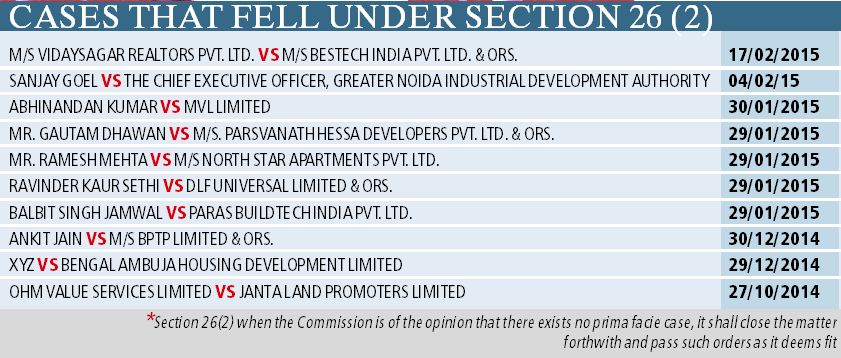
Gautam Dhawan, resident of DLF Park Place, Gurgaon, moved the Competition Commission of India (CCI) last year against Delhi-based Parsvanath Hessa Developers Pvt Ltd, alleging abuse of dominant position by the developer. He had booked a residential apartment in Parsvnath Exotica at a sale price of Rs 5,78,76,525, only to find out later that the developer had allegedly abandoned the construction of the building and later added two floors without giving him any notice. Also, a new tower was added in front of the building he had applied for, thereby depriving him of garden facilities.
However, the case was closed by the fair competition watchdog as it did not have any competition-related issue. Had there been a real estate regulator, an official from the CCI said on the condition of anonymity, Dhawan could have taken his grievance to it for getting justice. This is one of over 30 such complaints that CCI has received from individuals and resident associations alike regarding alleged abuse of dominance and monopoly by builders and developers. While CCI is a platform for issues relating to monopolistic trade practices involving players within the industry, in the absence of the sectoral regulator, the aggrieved individuals lined up outside the doors of the competition watchdog, enthused by the Rs 630-crore penalty order that was passed by the CCI against real estate major DLF in 2011.

CCI chairman Ashok Chawla said that though there certainly were cases which had competition issues, “lot of cases which came to us don’t fall into our domain. Some cases involved malpractices which ideally should not have come to us and should have gone to a sectoral regulator”.
The CCI had in fact underlined the concern while passing the order in the DLF case. It had said that both the Centre and state governments should come out with real estate regulations “at the earliest” for ensuring overall consumer welfare and to discourage unfair trade practices “that seem prevalent in the sector”.
Even though there are plethora of laws, there is no proper regulation of the real estate sector, mainly the housing sector. The Real Estate (Regulation & Development) Bill, drafted by the previous UPA government, which offers protection to consumers, is yet to see the light of the day. The Bill prohibits a developer to change the plan in a project unless two-thirds of the allottees have concurred for such a change. While providing for specialised regulation and enforcement, the Bill also gives powers to enforce specific performance, hitherto not available under the consumer laws. A designated authority will have powers to give directions for specific performance powers to impose penalty for non-registration of projects including imprisonment for continuous violation up to 3 years.
It will also make it mandatory for promoters to register all projects, prior to sale and only after having received all approvals from development and municipal authorities. This will protect buyers’ investments. The developers will also have to disclose project details and contractual obligations vis-à-vis the project and the buyer so as to promote informed choice for the buyers.
Arun Kumar Mishra, former secretary, ministry of housing and urban poverty alleviation, said that the existence of a regulator will not only relieve the CCI, which is meant for issues pertaining to industry participants, but will also help the consumer courts. “The real estate regulation Bill has provision for addressing the consumers issues. While it talks of resolving all disputes relating to real estate, it also has a provision to have a facilitation officer who will adjudicate between the affected parties and therefore only serious cases will go to the regulator,” Mishra said.
Most of the cases which were closed by the CCI were brought to it by individuals including Avtar Singh vs M/s Ansal Township and Land Development Ltd. & Ors; Dalip Singh Arshi vs M/s Aerens Jai Reality Pvt. Ltd. & Ors; Arvind Kumar Sachdev vs M/s. Emaar MGF Land Limited & Ors; Raj Kamal Bhatia vs M/s Supertech Limited and Naresh Bansal & Ors. vs M/s Omaxe Limited. The complaints are largely related to change in zoning plans, one-sided and biased clauses in agreements with consumers, delay in allotments and possession, keeping buyers in the dark about the eventual shape, size, or location of the apartment, and high penal interest in case of delay in payment among others. Rohit Raj Modi, President, Confederation of Real Estate Developers’ Associations of India (Credai) NCR, said that consumer courts are a better platform for taking up such cases. “While the two most common issues that consumers face are delayed delivery and project offering not in line with the promise made by the developer, individuals looking for reprieve go to all possible avenues. Since the CCI has mandate only for cases relating to monopolistic trade practices, consumer courts are a better platform,” he said.
Making a case for the sectoral regulator, he said that it should have the mandate to regulate the entire industry including all stakeholders and “only then will we see a reduction in the number of such complaints. Only the developer is not responsible for delays, the authorities are more responsible and so the regulatory bill must cover all aspects to be more effective.”

